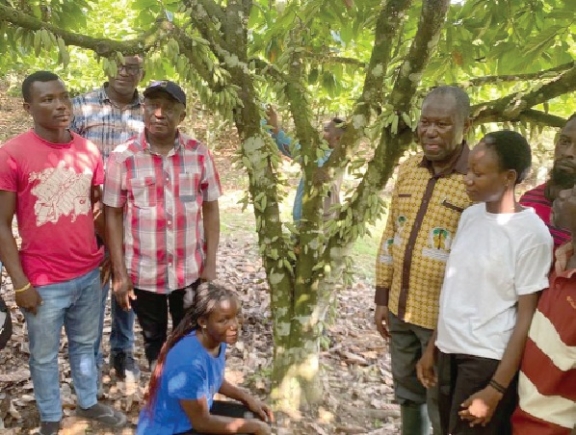
Cocoa producer price up next season — Farmers urged to increase yields
The producer price of cocoa will be reviewed upwards in the upcoming season which starts in October, the Chief Executive Officer of the Ghana Cocoa Board (COCOBOD), Joseph Boahen Aidoo has hinted.
With prices surging on the international market, he said the farm gate prices would definitely go up and therefore urged farmers to adopt good practices that would help increase their yields to take advantage of the upcoming price review.
He said COCOBOD had already started negotiating for its forward contracts and from all indications it would get more than the $2600 benchmark price in the 2023/2024 season.
During a tour of some cocoa farms in the Central and Western South Regions, farmers raised concerns about the producer price of cocoa and why it did not reflect the current international prices.
Mr Aidoo explained that this was because COCOBOD has since its inception adopted forward sales as against spot sales and this had worked perfectly as it helps in planning also helps in hedging prices against any shocks.
“With the new season set to start in October, the question on the minds of most farmers is whether the Price Review Committee will increase the producer price and the answer is obvious.
“Because we do forward sales and at the time that we are doing these forwards sales, prices have improved far better than we saw last year so obviously this will reflect the producer price when the new season opens,” he explained.
Government in April this year reviewed the producer price of cocoa by 58.26 per cent from GHC20,928 per tonne to GHC33,120 per tonne for the rest of the 2023/2024 season. This translates to GHC2,070 per bag.
Assessment of cocoa farms
As part of measures to boost cocoa yields in the upcoming season, the COCOBOD CEO, together with top management members visited 11 cocoa communities to assess how the farms were faring.
The trip was also to assess and do an appraisal of the various interventions introduced by COCOBOD.
The COCOBOD CEO said productivity per hectare which is the average yield per hectare in Ghana was one of the lowest in the World.
“Our aim is to improve on this, we have some of the best soils in the world and the conditions here are most suitable for cocoa production therefore if we are producing around 0.450 tonnes per hectare, whereas in other places, they are recording 1.5 to 2.5 tonnes per hectare then it’s not the best,” he stated.
With the COCOBOD interventions, he said the yield per hectare has now improved to 0.600 per hectare but there was still more work to be done.
“All has not been perfect but I am satisfied with what we have done so far. The various interventions have caught on very well with a number of our farmers and from this field trip, you noted from Central region through to Western South that many of the farmers are complying with the various interventions.
“Pruning is very important and I can confidently say that about 80 per cent of the farms have been pruned and those that haven’t done it, we are encouraging them to do so,” he stated.
Hand pollination
Mr Aidoo also advised farmers to adopt the hand pollination technique in order to increase their cocoa yields.
While he was not satisfied with the adoption rate of hand pollination in the Central region, the CEO commended farmers in the Western South region, especially those in Bompieso for their adoption of hand pollination.
“We can see that hand pollination is one of the driving force of our campaign to increase productivity and Bompieso is a good example of the work of hand pollination.
Some of trees had more than 2000 fruits and there were some with about 3000 cherelles which is amazing.
“We want as many farmers as possible to adopt the hand pollination technique. If rely solely on the natural pollination, you will do about eight bags per acre but with hand pollination, you can get about 20 bags per acre,” he stated.
Use of weedicides
The COCOBOD CEO also cautioned farmers on the use of weedicides on their farms, noting that it poses significant health and depletes the soil nutrients.
Recently in the European Union Parliament, concerns were raised over the use of weedicides in farming, with calls for its ban.
It was established that food that has come into contact with some of these weedicides had the potential of causing liver and kidney cancer.